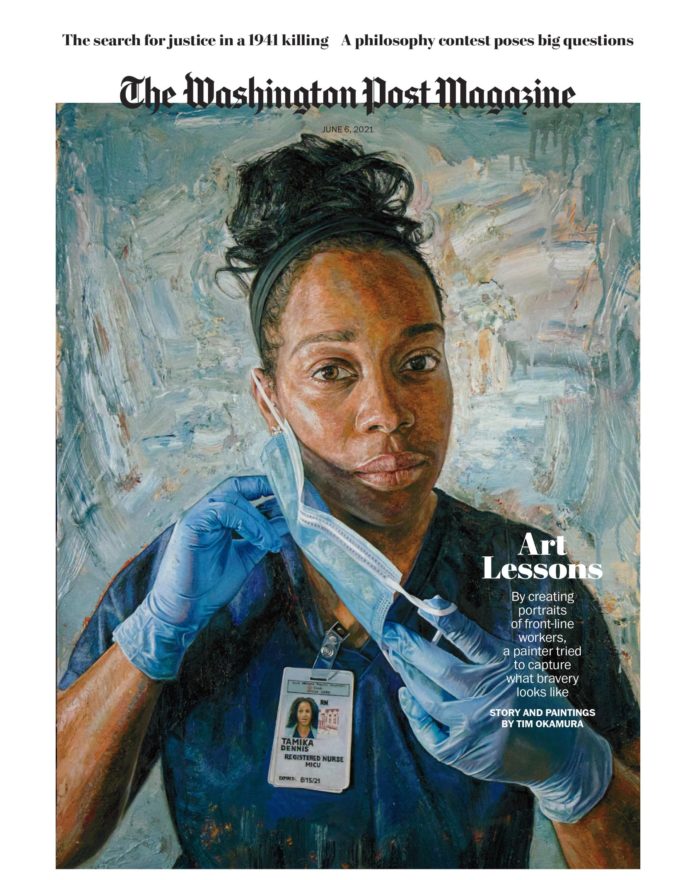
A Mercer University Georgia Baptist College of Nursing alumna recently found herself on the cover of The Washington Post Magazine.
A portrait of Tamika Dennis, who graduated with a Bachelor of Science in Nursing in 2018, was featured as part of the magazine’s June 6 cover story written by artist Tim Okamura, who painted nurses on the front lines during the pandemic.
Dennis, an art collector, had been a fan of Okamura’s work for a while. Working in New York as a traveling nurse in the early months of the pandemic, she was picking up a piece of art from him when they started talking about Okamura’s recovery from COVID-19.
“I was asking him how he’s doing, and we were speaking on the psychological tolls that have impacted everyone with COVID that many people don’t talk about,” Dennis said. “And that conversation turned into like a three-hour conversation, and that just turned into more conversations about COVID and things that I was witnessing and things that he was witnessing living across the street from a hospital in New York …
“He asked me if I would mind doing the portrait, and I said, ‘Of course.’ I thought it was a great idea.”
The painting depicts Dennis from the chest up, wearing navy blue hospital scrubs, her hospital name tag and blue gloves. A standard medical face mask is looped over one ear, with her hands positioned on the mask as if she is in the process of putting it on or taking it off. Her dark hair is in a messy bun, held out of her face by a black head band.
“I thought it was important to make sure I had my gloves and my mask on, and so we just started working from there with some looks,” she said. “And then he did the portrait, and I loved it.”
Dennis decided to become a traveling nurse after seeing the toll the pandemic was taking in the Northeast.
“They were really severely hit, so I wanted to be up there, I wanted the experience, and I wanted to help,” she said. “There were a lot of situations of them not having enough critical care nurses to help out with the pandemic.”
As a nurse on the intensive care unit, Dennis saw only COVID-19 patients. It was tough seeing almost none of her patients make it out of ICU, she said. Communicating status updates, most of which were not good, to family members using FaceTime took a psychological toll, as did knowing that being unable to have visitors could negatively impact a patient’s recovery.
“Every patient was different for the same illness … you have five different patients, and none of them have the same problem,” she said. “It was tough. It hit really hard.”
Dennis said her longest assignment was at Phoebe Putney in Albany, the epicenter of a major COVID-19 outbreak in Southwest Georgia. She was part of a group of travelers hired to run an entire campus devoted to COVID-19 patients.
“It was hard. It was a learning experience,” she said. “I’m happy that we’re starting to see the other side of it because initially, working in it, I felt like this pandemic kind of hit medical professionals like a ton of bricks.
“And I know, me, myself, I have an expectation of a doctor or nurse being able to tell me what’s going on, and I know a lot of times we couldn’t tell anyone what was going on because we didn’t know.”
Dennis was working at Phoebe Putney when she posed for the portrait. She sent Okamura some pictures to get started, and then she sat for four hours at his studio in New York.
She keeps the portrait in her Georgia home, where she’ll be until the end of June when she leaves for her next assignment in Philadelphia.
Dennis said Mercer prepared her well to take on these crisis assignments.
“I really do always rave about Mercer because I think what they did is they not only prepared us with knowledge, but they also prepared us to critically think and to be confident to know that we have the ability to be great nurses,” she said. “And I just think for me, personally, with all that I went through when I was in nursing school, Mercer taught me not to give up.”









